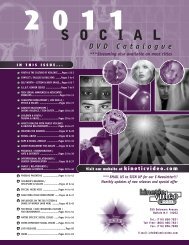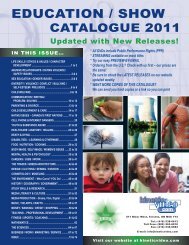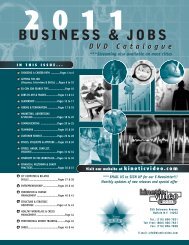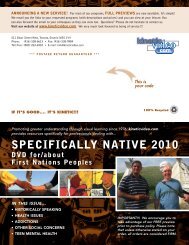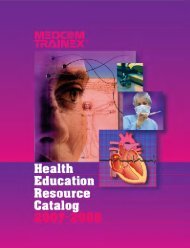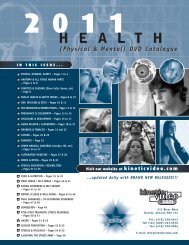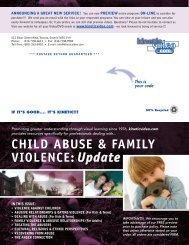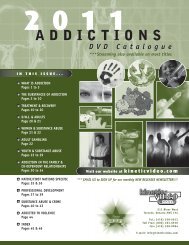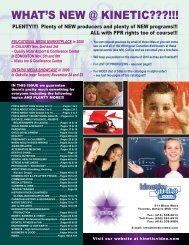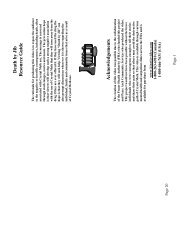WHAT'S NEW @ KINETIC???!!! - Kinetic Video
WHAT'S NEW @ KINETIC???!!! - Kinetic Video
WHAT'S NEW @ KINETIC???!!! - Kinetic Video
Create successful ePaper yourself
Turn your PDF publications into a flip-book with our unique Google optimized e-Paper software.
OVERCOMING EARLY LIFE TRAUMA: Creating a Second Chance<br />
Dr. Caldwell C. Nuckols addresses why early childhood neglect or abuse is a consistent finding in criminal justice offenders<br />
and chronic relapsing alcoholics and addicts. He explains how neglect and abuse is associated with violent behavior, criminal<br />
activity, teenage pregnancy, becoming a perpetrator, becoming a victim of trauma, psychiatric disorders, and substance<br />
abuse. This program outlines proven strategies that provide the viewer the opportunity to overcome the past and create a<br />
second chance. #11661/2180 Two 30-minute parts on one DVD 2007 $319.95<br />
MATRIX MODEL FOR TEENS & YOUNG ADULTS Family Curriculum (Intensive Outpatient Alcohol and<br />
Drug Treatment Program) - Family participation in treatment enhances a client's progress, especially in the case of young<br />
clients. This package is evidence-based adapted from the best-selling intensive outpatient program for adults. Like the adult<br />
program, the teen Matrix Model comes with a family component. The Family Program is available separately so you can<br />
implement it with existing treatment or outpatient programs. This 12-week package includes a facilitator's guide, handouts<br />
(hard copies and on CD-ROM), and three DVDs: Road Map for Recovery, Triggers and Cravings, and Families in Recovery. The<br />
Family Program is divided into two subgroups, one for patients and one for parents/caregivers, providing information in ways<br />
that each group responds to best. #11550/0795 2007 $495<br />
BRIEF THERAPY FOR ADDICTIONS SERIES<br />
This series consists of seven programs:<br />
1) STAGES OF CHANGE FOR ADDICTIONS<br />
with John C. Norcross<br />
Years of research by Dr. Norcross and his colleagues have<br />
helped to identify the stages people go through in<br />
addressing and confronting addictions. In a psychotherapy<br />
based on this model, strategies and relationship stances<br />
are matched to the individual client's stage. See Dr.<br />
Norcross works with a client who is in early recovery from<br />
cocaine addiction and contemplating changing his use of<br />
alcohol.<br />
2) MOTIVATIONAL INTERVIEWING with William R. Miller<br />
Dr. Miller demonstrates how Motivational Interviewing<br />
helps people resolve their ambivalence about changing<br />
addictive behaviors. The therapist creates an atmosphere<br />
that is conducive to change by expressing empathy and<br />
encouragement, rolling with resistance, and helping the<br />
client explore the gaps between their current behaviors<br />
and the life they would like to lead. In this video, Dr.<br />
Miller works with a client who is considering changing his<br />
alcohol use and smoking habits.<br />
3) COGNITIVE THERAPY with Bruce S. Liese<br />
Watch Dr. Liese demonstrate his cognitive therapy<br />
approach for addictions, as he collaborates with the client<br />
to identify and change the thought patterns and<br />
maladaptive beliefs that relate to addictive behaviors and<br />
lead to substance abuse. In this video, Dr. Liese works<br />
with a client whose issues include alcohol abuse, cocaine<br />
abuse and involvement in the criminal justice system.<br />
4) INTEGRATING THERAPY WITH 12-STEP PROGRAMS<br />
with Joan Ellen Zweben<br />
Psychotherapy and 12-step groups have complimentary<br />
roles in a client's process of recovery, so illustrates expert<br />
on addictions Dr. Zweben as she focuses on the role of<br />
such groups as Alcoholics Anonymous and Narcotics<br />
#11535/1745 Seven Programs 2007 Includes Guides $199.95 each or Series $1,198.95<br />
Anonymous within the therapy session. In this video, Dr.<br />
Zweben works with a Desert Storm veteran who is<br />
currently drinking and who is considering the possibility of<br />
contacting Alcoholics Anonymous.<br />
5) HARM REDUCTION THERAPY FOR ADDICTIONS with<br />
Dr. G. Alan Marlatt<br />
Harm Reduction Therapy is an innovative approach that<br />
focuses on reducing the harmful consequences of drug<br />
use. The therapist accepts the client on his or her own<br />
terms and tries to reduce barriers to treatment. In this<br />
video, see expert on harm reduction therapy and relapse<br />
prevention, Dr. Marlatt, work with a heroin-addicted<br />
client who is considering entry into a methadone program.<br />
6) COUPLES THERAPY FOR ADDICTIONS with Dr. Barbara<br />
S. McCrady<br />
Dr. McCrady reminds us that alcohol and drug problems<br />
always exist in a context that includes families and<br />
relationships, and that couples therapy is an important<br />
model for working with addictions. Dr. McCrady uses a<br />
behavioral approach that helps the client change his or<br />
her addictive behaviors, helps the partner learn to<br />
respond differently, and helps the couple change the<br />
relationship itself. In this video, Dr. McCrady works with a<br />
young couple trying to change behaviors related to<br />
alcohol and marijuana use.<br />
7) REALITY THERAPY FOR ADDICTIONS with Robert<br />
Wubbolding, EdD<br />
Watch as Dr. Wubbolding adapts his renowned Reality<br />
Therapy approach to work with clients struggling with<br />
addictions. His practical and systematic approach helps<br />
clients evaluate the effectiveness of current behaviors<br />
and focus on practical plans of action for change. In the<br />
video, Dr. Wubbolding works with a client whose recovery<br />
from cocaine addiction is complicated by depression.<br />
INTERACTIVE GROUP THERAPY IN ADDICTION: Interventions for Dynamic Groups<br />
This program is aimed at clinicians, therapists, trainers, supervisors/managers of group programs as well as general health<br />
professionals and students preparing to use group therapy as a treatment modality. It provides an opportunity to observe the<br />
process and techniques of interactive group therapy for drug and alcohol dependent persons. The purpose is to facilitate<br />
understanding and sensitivity to group process across cultures and to demonstrate the most important function of a group<br />
leader - directing the focus of the group through interventions that promote dynamic interaction. The seven vignettes follow<br />
a group through their development from the Acquaintance Phase to the Working Phase. Details various forms of resistance<br />
that group leaders can expect to meet and offers guidelines to bring about optimal results.<br />
#9223 Seven easily maneuverable vignettes 13 to 32 minutes each $369.95 *Includes 49-page Guide<br />
***See also our HEPATITIS titles on Page 22 of this catalogue!!!<br />
54



